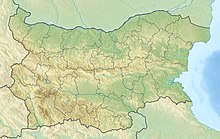This article needs additional citations for verification. (July 2008) |
| Battle of Varna | |||||||
|---|---|---|---|---|---|---|---|
| Part of the Crusade of Varna and the Ottoman wars in Europe | |||||||
 The Crusaders were trapped below. Their defeat permitted the Conquest of Constantinople. Beyond the Ottoman Sultan and the Janissaries was the cradle of medieval Bulgaria. | |||||||
| |||||||
| Belligerents | |||||||
| Ottoman Empire | Varna Crusaders: | ||||||
| Commanders and leaders | |||||||
|
Murad II Prince Mehmed[1] Karaca Pasha |
Julian Cesarini † Stephen III Báthory † Michael Szilágyi Franko Talovac Jan Chapek Simon Rozgonyi † John de Dominis † Rafael Herczeg | ||||||
| Strength | |||||||
| Or in total 40,000[6][7][unreliable source?] |
20,000 (6,000 Hungarians, 5,000 troops by Hunyadi, 4,000 Polish cavalry, 4,000 Wallachian cavalry, 1,000 Crusaders recruited by Cesarini)[6] | ||||||
| Casualties and losses | |||||||
|
Heavy casualties 10,000–15,000[10][unreliable source?] |
About half the army[4][11][12] 65,000[13][unreliable source?] | ||||||
Location within Bulgaria | |||||||
The Battle of Varna took place on 10 November 1444 near Varna in what is today eastern Bulgaria. The Ottoman army under Sultan Murad II (who did not actually rule the sultanate at the time) defeated the Crusaders commanded by King Władysław III of Poland and Hungary, John Hunyadi (acting as commander of the combined Christian forces) and Mircea II of Wallachia. It was the final battle of the unsuccessful Crusade of Varna, a last-ditch effort to prevent further Ottoman expansion into the Balkans.[14][15]
- ^ İnalcık, Halil (1954). Fatih devri üzerine tetkikler ve vesikalar. p. 107.
- ^ a b c d Frank Tallett, D. J. B. Trim. European Warfare, 1350–1750. Cambridge University Press, 2010. p. 143
- ^ a b Jean W. Sedlar. East Central Europe in the Middle Ages, 1000–1500. University of Washington Press, 2013. p. 247
- ^ a b c Setton 1978, pp. 89–90.
- ^ Stephen Turnbull. The Ottoman Empire 1326–1699. Bloomsbury Publishing. 2014. p. 32
- ^ a b Bánlaky, József. "A várnai hadjárat 1444-ben – Események a várnai csatáig" [The Campaign of Varna in 1444 - Events up to the Battle of Varna]. A magyar nemzet hadtörténelme [The Military History of the Hungarian Nation] (in Hungarian). Budapest.
- ^ "Sultân II. Murâd".
- ^ Emecen, Feridun "VARNA MUHAREBESİ". islamansiklopedisi.org. (in Turkish)
- ^ Osmanlı Devleti'nin Kuruluş Tarihi (1299-1481) Müneccimbaşı Ahmed B. Lütfullah
- ^ Varna (1444), Kosova (1448) Meydan Muharebeleri ve II.Murat. Genelkurmay Askerî Tarihi ve Stratejik Etüt Başkanlığı (PDF) (in Turkish). Kültür ve Turizim Bakanlığı. p. 79.
- ^ Johann Wilhelm Zinkeisen, Geschichte des osmanischen Reiches in Europa, vol: 1, pp. 700–705
- ^ "Battle of Varna". britannica.com.
- ^ Varna (1444), Kosova (1448) Meydan Muharebeleri ve II.Murat. Genelkurmay Askerî Tarihi ve Stratejik Etüt Başkanlığı (PDF) (in Turkish). Kültür ve Turizim Bakanlığı. p. 79.
- ^ Bodnar, Edward W. Ciriaco d'Ancona e la crociata di Varna, nuove prospettive. Il Veltro 27, nos. 1–2 (1983): 235–51
- ^ Halecki, Oscar, The Crusade of Varna. New York, 1943

